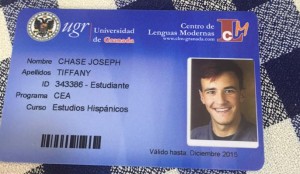 |
| El centro de lenguas modernas in Granada. Who wouldn't want to take classes here? |
Firstly, class structure is different in Spain. Typically, it should be expected that you will have class two times a week, usually a Monday/Wednesday or a Tuesday/Thursday class. It’s true that you will more than likely not have a Friday class, but if there is a long weekend where Monday classes are canceled due to a holiday, expect a make-up day on Friday. A good example of this would be Columbus Day weekend in which we didn’t have class on Monday and have to make up those classes on Friday. Besides this, you should also expect that the classes might be longer due to the 2 classes a week system. Our classes are in periods of 2 hours.
 |
| Sometimes your homework is actually to explore the city! This is a tapas restaurant we had to go to for a project! |
Also in terms of class set up, the grading system is different. More emphasis is put on class participation and tests here. You should expect to try to take part in every single class activity if you want to succeed here. It is true that you don’t have as much homework here, and you might find that if you get assigned homework, they might not even collect it. The emphasis here is on your understanding of the subject and ability to learn from the professor. Your grade typically comes from your class participation, attendance, test scores, and homework grades, but unlike the US, the most valuable of these is participation and tests.
An example of this would be the September intensive Spanish course that I finished a few weeks back. We did have homework, but it was never collected. We had one test: the final. We had one project, which was also a part of the final. This means that our daily activities held a large weight on our results from the class. It’s almost refreshing in a way because your score in the class can directly benefit from getting engulfed in the community/city and improving your Spanish (though it will obviously be different for different subjects). Although, you don’t need to worry too much over your ability to take classes in a foreign language if your level is lower than others; you take a placement test when you arrive in your study abroad city, and this will directly affect what classes you will take.
 |
| You receive your student ID card at the beginning. Earn it! |
If I had to give advice to anyone looking to get used to the system here, I would say that you need to become used to the idea of not having as much homework, but still maintaining the responsibility that comes with having homework. You need to practice outside of class. You need to take good notes. You need to pay attention in class.
Although studying abroad is an experience of a lifetime, you must also balance your schoolwork. Otherwise, you’ll find that you may leave your study abroad city without reaching your full potential abroad.
Chase is the Fall 2015 CEA MOJO Blogger in Granada, Spain. He is currently a Senior at Southern Illinois University Edwardsville.









